To find a writing buddy, explore local writing groups or community centres, join online writing platforms or communities, and consider posting an ad outlining your project and what you are seeking in a writing partner. A writing buddy can be a useful way to stay focused and accountable with your writing goals in general or when participating in writing challenges, such as AcWriMo (academic writing month) or NaNoWriMo (national novel writing month). Having someone to share the writing process with can help you navigate challenges and maintain motivation. Finding a writing buddy can help you share your ups and downs with other writers and keep each other motivated. Your writing buddy will likely experience similar struggles and successes.
This post outlines how to find a writing buddy, both offline and online, provides advice on posting an ad to find one and clarifies what kind of feedback a writing buddy may not be able to offer. Read on to learn practical ways to find the right writing partner for your needs.
- What is a writing buddy?
- How to find a writing buddy offline?
- How to find a writing buddy online?
- How to post an ad when looking for a writing buddy?
- What feedback on your writing a writing buddy cannot offer?
- Pros and cons of working with a writing buddy
What is a writing buddy?
A writing buddy, critique partner or accountability partner is a someone who shares the writing process with you, offering support, motivation and accountability while exchanging feedback and experiences. In other words, a writing buddy is a partner who can help you achieve your writing goals by sharing your writing struggles, lack of motivation or bouts of procrastination. However, having a writing buddy also means sharing the positive aspects of writing, such as celebrating accomplishing the goals and milestones. It goes both ways, so when your buddy struggles, you also need to show up for them and support them through the thick and thin of writing.
How to find a writing buddy offline?
To find a writing buddy offline, check local community centres or libraries for writing groups or start your own group by inviting local writers to meet regularly for support and feedback. Here is a brief overview of how to find a writing buddy in the offline world.
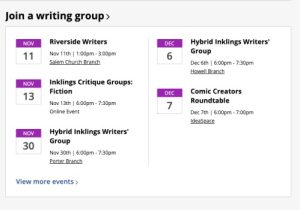
Check local community centres and libraries
Libraries and community centres often have books-related groups, which may include writing groups. They may meet regularly to read and critique each other’s work and share writing resources they have found. If your local community does not have a writing group, it may be worth starting your own group. For instance, you could approach the library or community centre staff to check if they would support the group in their facilities.
Start a writing group
One way to find a writing buddy is to start your own group. But before you invite local writers to join you, consider the rules that will guide the group’s premise and establish the answers to the following questions:
- What is the aim or objective of the group (sharing inspiration, critiquing each other’s work, ensuring accountability or meeting milestones)?
- What is the scope of the group’s meetings (only writing or also publishing, editing and marketing books)?
- Who can join the group (e.g. in terms of writing experience and progression of their writing project)?
- How will the critique or feedback be delivered? (in-person, written reports, marked-up text)?
Next, figure out the practicalities of the meetings:
- time and place
- frequency (weekly, bi-monthly or monthly)
- duration (one hour or longer)
- format (a single text or multiple discussed each time)
Finally, and most importantly, invite local writers to join your writing group. You could publish an ad in your local newspaper or put flyers in the local shops’ windows. However, creating a group on meetup.com could be a more straightforward and less time-consuming way of finding a writing buddy.
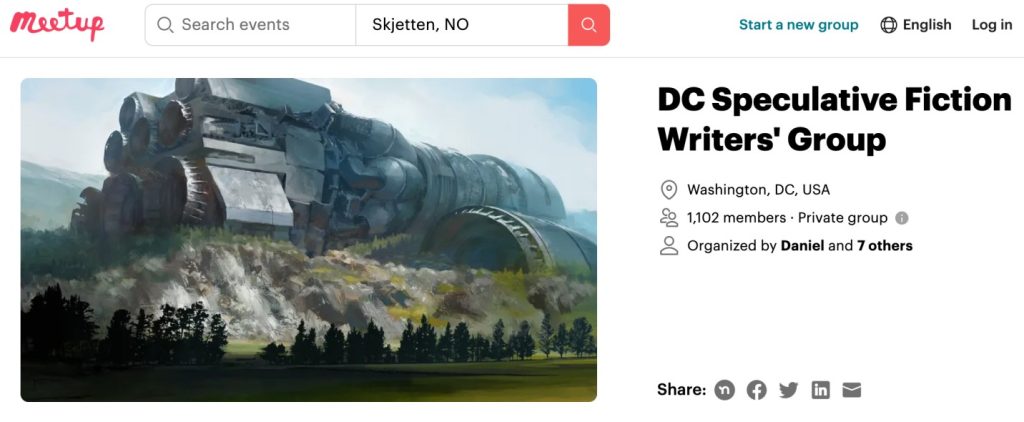
Check national and regional associations for writers
In many countries, there are national and regional organisations that support writers by offering information, advice and funding. For instance, here is a list published by Penguin of national and local-level organisations supporting writers across the UK. You can contact them to get information on the existing writing networks in your area. These organisations can also offer help when you decide to set up your own writing group by, for instance, including information about your initiative in the communications to their members. Moreover, there may be funding available to support your writing group.
Ask a friend to check on your progress
A writing buddy does not have to be a writer. It usually works best between two (or more) writers because it facilitates mutual help and support. However, it may not always be necessary. If you want to find a writing buddy to monitor your progress and make sure you meet your milestones, anyone can be your writing buddy. A friend, a family member or a neighbour who agrees to help you be accountable and monitor your writing progress can be your writing buddy.
Attend writing conferences and events
Attending in-person or virtual writing conferences such as Writers Digest Conference or genre-specific ones like the Society of Children’s Book Writers and Illustrators offers a great opportunity to meet fellow writers who may be looking for a writing buddy. These events are designed to foster connections, often with networking sessions aimed at helping writers meet and collaborate. Here is a list of organisations and conferences that may help you find a writing buddy:
- Alliance of Independent Authors
- Association Children’s & Writing Programs
- CrimeFest, organised by the International Crime Fiction Convention
- FantasyCon, organised by the British Fantasy Society
- Historical Novel Society
- Romance Writers of America
- Society of Authors
- Society of Children’s Book Writers and Illustrators
- ThrillerFest, hosted by the International Thriller Writers
- Writer’s Digest Annual Conference
Spend time at writers’ residencies and retreats
These are immersive events where writers gather for focused writing time. Residencies like Yaddo or provide structured environments where you can work closely with other writers over extended periods, making it easier to establish writing partnerships. Here are some residencies and retreats in the US and UK:
- Arvon Foundation (UK) offers residential writing courses and retreats in rural locations. It is ideal for writers looking to work with tutors and peers in a focused environment.
- Gladstone’s Library (Wales) is the only residential library in the UK, offering writers a peaceful place to work surrounded by books, along with opportunities to interact with other writers and scholars.
- Hedgebrook (Washington, US): A retreat for women writers, offering the chance to focus on writing while also connecting with a global community of female authors.
- MacDowell Colony (New Hampshire, US) is one of the oldest artist colonies in the US, offering residencies for writers, musicians and visual artists to create in a peaceful, focused environment.
- Moniack Mhor (Scotland) is a rural retreat in the Scottish Highlands offering writing workshops, mentorships and residencies. Writers stay in a remote setting, providing space for creativity and collaboration.
- The Garsdale Retreat (Yorkshire, UK) is a rural writing retreat that offers courses, mentorship and quiet time for writing in a community-focused environment.
- The Ragdale Foundation (Illinois, US) offers residencies for writers to work in solitude, with opportunities for communal dinners and networking with fellow residents.
- Yaddo (New York, US): A prestigious artist residency that supports writers, composers and visual artists. Writers can spend weeks or months here, working on their projects in a quiet, collaborative environment.
How to find a writing buddy online?
To find a writing buddy online, join writing-focused platforms or communities like Facebook groups, Critique Circle or genre-specific forums, where writers connect for support and feedback. Here is an overview of online groups and platforms that may help you find a writing buddy.
Join a Facebook group
Facebook has tonnes of groups for writers where you can find a writing buddy.
Writers Unite! (WU!) Facebook group has nearly 73,000 members. The group offers you an opportunity to find a perfect writing buddy. Its mission is to support and encourage writers at all levels of knowledge and experience. Furthermore, WU! enables writers to share their writing, receive and provide constructive feedback and answer questions related to their writing.
Insecure Writer’s Support Group has over 5,000 members. Its mission is to share and encourage. There, writers can express doubts and concerns without fear of appearing foolish or weak. Those who have been through the fire can offer assistance and guidance. In sum, it is a safe haven for insecure writers of all kinds.
10 Minute Novelists Group is devoted to helping time-crunched writers. The group helps develop the habit of writing, learning the craft and building writer’s careers in small increments of time. It boasts nearly 17,000 members and encourages members to ask questions, engage with others and volunteer help and advice.
Join a writing community
Among countless online writing communities, you can join one of those specialised groups that focus on the genre of your text. Alternatively, consider joining a larger group with a broader scope to increase your chance of finding a writing buddy.
General online writing groups
Critique Circle claims to be one of the oldest online groups for writers. Founded in 2003, it claims to be closing in on one million served critiques. It offers a freemium access where membership is free but there is also a premium subscription, which unlocks additional features, such as the Buddy list. The standard premium membership costs $11 per month or $65 annually, while the Gold Premium plan costs $18 per month or $95 annually.
Camp NaNoWriMo is a month-long collective writing challenge occurring every April and July. In contrast to the November NaNoWriMo (national novel writing month), the Camp offers the flexibility of setting your word count challenge. (In comparison, the annual November NaNoWriMo challenges you to write a 50,000-word novel.)
Scribophile boasts of being one of the largest and most award-winning online writing communities. It offers free and premium (paid) membership options. The free membership gives access to most features, but for added benefits, there is a premium option. The premium membership costs $11 per month or $65 per year, and it includes features like unlimited works posted for critique and private messaging.
Moreover, all Scribophile members must follow its code of conduct, which may ensure a safe and sensitive accountability environment.
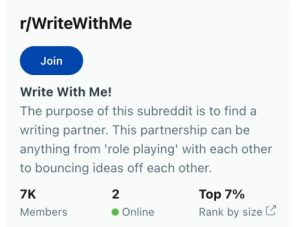
Accountabuddy Exchange allows you to find someone to hold you accountable, cheer you on and help you back up when you fall down. The Exchange has a simple form to fill out when looking for a writing buddy.
WriteWithMe is a Reddit community offering help to find a writing partner. It has nearly 8,000 members. Furthermore, its only purpose is to facilitate finding a writing buddy or a beta reader. However, it does not allow posting any other type of content.
Genre-specific online writing groups
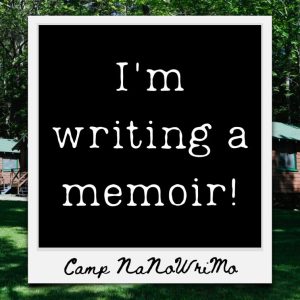
Camp Memoir is a writing group dedicated to memoir authors. There, you can share your writing goals and access their extensive resource library.
Speculative Fiction Writers Association meets weekly on Zoom to discuss writing topics and critique each other’s work. They invite science fiction writers working on fiction, fantasy, horror, time travel, climate fiction/solar-punk, slipstream, steampunk, weird west, fairy tales, alternate history, dystopian/utopian or cyberpunk for MG, YA and adults.
Chronicles is a science fiction and fantasy community. Their writing forums provide help and feedback on writing, including general writing queries, discussions about agents, editors and publishers, as well as writing resources and a section for critiques.
Therapeutic Writing Group helps members foster insight and self-awareness as well as generate support from others through the process of writing. This group may be beneficial for writers working on self-help or self-development manuscripts.
Writing Historical Fiction group is for individuals seeking active support from others who love historical fiction. This includes those who love writing historical fiction, love reading historical fiction and are agents representing historical fiction writers or publishers of historical fiction.
Post regular updates on your website, blog or social media
If you want a writing buddy to measure your accountability, consider using social media, your blog or website instead. Post regularly on X (Twitter), Discord or Mastodon and inform your followers about the progress of your writing project. Use hashtags such as #AmWriting or #WritingCommunity to attract the relevant audience.
How to post an ad when looking for a writing buddy?
When posting online in search of a writing buddy, make sure to include the following details:
- the genre of your text
- a summary of your text, for instance, an abstract for non-fiction and the plot line summary or a blurb for fiction,
- your level of experience (how many years you have been writing)
- the level of progression of your writing project (e.g. ‘just started,’ ‘stuck on chapter 3’ or ‘finished manuscript’)
- what you are looking for in a writing buddy (e.g. sharing inspiration, critiquing each other’s work, ensuring accountability or meeting milestones)
- your contact details (your website, email address or social media handles)
What feedback on your writing a writing buddy cannot offer?
Although having a writing buddy can be an excellent way to receive feedback on your writing, there are some limitations to be aware of. A writing buddy may not be able to offer the same level of critique or feedback as a professional editor can. The training of a professional editor goes beyond a casual familiarity with writing conventions. Editors often undergo specialised training in editing techniques, style guides and the nuances of various writing genres. This formal training enables them to approach your work with a critical eye and a deep understanding of the conventions specific to your writing context.
For example, a writing buddy may not have the experience or knowledge to provide line editing or developmental editing services. Line editing involves reviewing and improving the flow, clarity and tone of your writing. This type of editing ensures that your writing is polished, easy to read and engages the reader.
On the other hand, developmental editing involves looking at the big picture of your writing, such as the structure, pacing and character development or argument. A developmental editor can help you identify areas that need improvement and suggest ways to make your writing more engaging and impactful. In turn, a writing buddy may be able to provide some feedback on these elements, but they may not have the expertise to provide a comprehensive edit.
Pros and cons of having a writing buddy
The pros of having a writing buddy include increased accountability, motivation and constructive feedback, which can help you stay on track and improve your writing. However, the cons are potential compatibility issues, time commitment, and the possibility that their feedback may not be as comprehensive or professional as that of an editor.
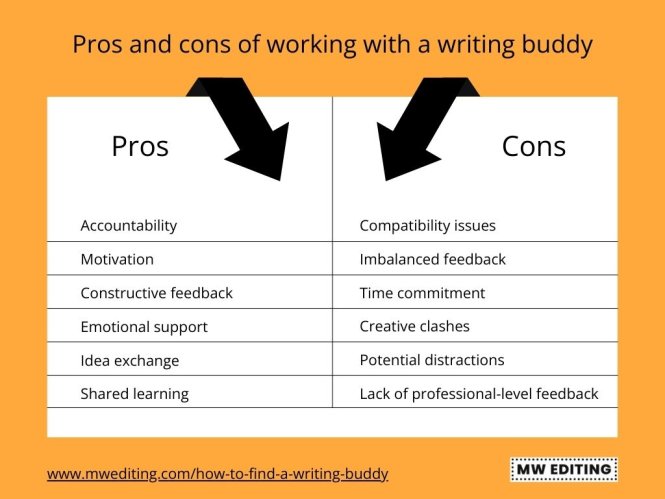
Pros
- Accountability: A writing buddy helps you stay committed to your goals by setting deadlines and tracking progress.
- Motivation: Sharing the writing journey with someone boosts motivation, particularly during periods of doubt or writer’s block.
- Constructive feedback: Your buddy can provide feedback on your work, helping to spot areas for improvement and giving new perspectives.
- Emotional support: Writing can be isolating, and a buddy offers encouragement and moral support, helping you push through difficult times.
- Idea exchange: Talking through ideas with your buddy can spark creativity and help solve story or structure problems.
- Shared learning: You can exchange techniques, strategies, and knowledge, enriching each other’s writing process.
Cons
- Compatibility issues: If your goals, work habits, or writing genres do not align, the relationship can become strained, leading to frustration.
- Imbalanced feedback: One writer may be more experienced than the other, which can lead to an unequal exchange of useful critique.
- Time commitment: Meeting regularly or keeping up with critiques can take up time, especially if schedules or expectations do not match.
- Creative clashes: Disagreements over feedback or differing creative opinions may sometimes hinder progress and create tension.
- Potential distractions: Focusing too much on the social aspect of the relationship might reduce the time spent writing or meeting targets.
- Lack of professional-level feedback: A writing buddy, while helpful, may not be able to offer the detailed, polished feedback that a professional editor would provide. They may lack expertise in areas like developmental editing or line editing.
Final thoughts
Finding the right writing buddy may be crucial to pushing your manuscript to the finishing line, whether you need support with accountability, manuscript critique or the loneliness of the writing process.
Contact me if you are a author looking for editing or indexing services. I am an experienced editor offering a free sample edit and an early bird discount.

